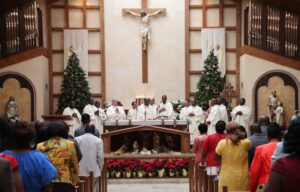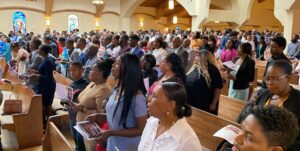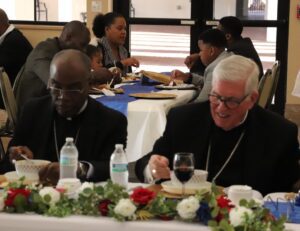On the 220th Anniversary of Haiti as the first Independent Republic in the Caribbean, the Diocese of Venice, in conjunction with the Haitian Catholic Community, celebrated a Mass at St. Leo the Great Parish in Bonita Springs on Jan. 1, 2024, the Solemnity of Mary, the Holy Mother of God.
Faithful from throughout the Diocese of Venice attended the Mass which was celebrated by Most Rev. Charles Peters Barthélus, Bishop of the Diocese of Port-de-Paix, Haiti, with Bishop Frank J. Dewane concelebrating. In addition, there were numerous priests from the Diocese who also concelebrated.

Bishop Barthélus prayed for Haitians in the Diocese of Venice who live far from their homeland, that they remember their roots and continue to pray for all Haitians who continue to live in a country that is politically unstable and endures ongoing violence and poverty.
“The people of Haiti are strong people,” said Bishop Barthélus. “There is a determination and strength to the Haitian people that endures.”
The Bishop also spoke about the celebration of the independence of Haiti and how it importantly falls upon a major celebration of the Blessed Virgin Mary and the World Day of Peace.
Bishop Dewane thanked Bishop Barthélus for accepting his invitation to be a guest of the Diocese, saying his presence was a blessing as he came to share his time, wisdom and faith with the Haitian Catholic Community here.

“You are important not only because you are here today,” Bishop Dewane said. “Our Church here in the Diocese is all the more blessed to have you here as the richness of your Faith is evident to all.”
Crediting the priests who serve the Haitian Catholic Community in the Diocese, many from Haiti, Bishop Dewane thanked them for their dedication to the Church, to the Diocese and to the people of God.
Father Jean-Marie Fritz Ligondé, Diocesan Haitian Ministry Director and Parochial Vicar at St. Columbkille Parish, thanked Bishop Dewane for his unyielding support of the Haitian Catholic Community, including his support for the annual New Year’s Day celebration.
At the conclusion of the Mass, everyone joined in singing the Haitian National Anthem with many waving small Haitian flags.

Mirlande Augustin of St. Peter the Apostle Parish in Naples was overjoyed to be a part of the New Year’s Day celebration. “I moved to this Diocese after the 2010 earthquake devastated my hometown. Here, we found a beautiful home, and today we celebrate our heritage in a special way.”
A cultural celebration and dinner took place in the Parish Hall. This celebration featured, as its first course, the symbolically important joumou soup, a hearty blend of pumpkin (turban squash), potatoes, squash, beef, chili peppers and other ingredients. It was during the colonial period when the people of Haiti were forbidden from eating the soup because they were deemed too “uncivilized” by the French colonists. Therefore, when independence was achieved, the joumou soup became a lasting symbol of freedom.
For the Haitian community, Jan. 1 is both a spiritual day, and an emotional day commemorating such an important day in their homeland. The Haitians defeated the largest and most powerful army at the time, the army of Napoleon, in Cap-Haitien, and Haiti became the second country in the Americas to declare its independence on Jan. 1, 1804.
There are currently Masses celebrated each weekend in Haitian Creole at the following Parishes: St. Charles Borromeo in Port Charlotte; St. Francis Xavier in Fort Myers; St. Michael in Wauchula; Sacred Heart in Bradenton; Our Lady of Guadalupe in Immokalee; and St. Peter the Apostle in Naples. The New Year’s Day celebration is one of the few times the entire community can gather in one place.





